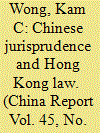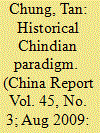| Srl | Item |
| 1 |
ID:
099811


|
|
|
|
|
| Publication |
2009.
|
| Summary/Abstract |
On 1 July 1997, Hong Kong, a colony (euphemistically called dependent territory) of Britain, was returned to the fold of the motherland, China, as a Special Administration Region, with a high degree of autonomy. Ten years on, we find that the common law system established by the British in Hong Kong, as guaranteed by the Basic Law, survived and thrived. A cursory review of legal and social science literature shows that there is little scholarly discourse or public debate on the proper jurisprudence standards to be applied in the making and evaluation of Hong Kong legislation. This research raises a most fundamental policy qua jurisprudence issue: Should Hong Kong law be formulated, applied or evaluated with indigenous legal standards and local jurisprudence principles, based on Asian values, Chinese culture and/or Hong Kong ethos? In so doing, this article questions the appropriateness and challenges the legitimacy of adopting Western jurisprudence principles in shaping and evaluating the Hong Kong legal system, especially after 1 July 1997.
|
|
|
|
|
|
|
|
|
|
|
|
|
|
|
|
| 2 |
ID:
099809


|
|
|
|
|
| Publication |
2009.
|
| Summary/Abstract |
The article is an exploration of an alternative geo-civilisational paradigm in an effort to escape the dissatisfaction with the prevalent geopolitical model. In the new 'geo-civilisational paradigm', the world should cherish the ideal of universal harmony as represented by 'shijie datong' (grand harmony in the world) aspired to by Chinese civilisation and 'vasudhaiva kutumbakan' (world as one family) aspired to by Indian civilisation. Such a paradigm can be established because we already have the example of it in the cultural interaction between Chinese and Indian civilisations in the past. Civilisational overlapping can create 'metonymic thesis' that serves to strengthen the vitality of civilisation and this only happens during the overlapping of mutually respectful and friendly civilisations. The uniqueness of the 'historical Chindian paradigm' is twofold, as the advent of Indian civilisation into China was by invitation and it also meant to accomplish serious business of an unprecedented inter-cultural joint venture, that is, the Sanskrit-Chinese translation enterprise. Second, the Sino-Indian cultural interaction gave a facelift to China which has uniquely survived for two millennia as the world's sustainable civilisational state.
|
|
|
|
|
|
|
|
|
|
|
|
|
|
|
|